-
01-01-2016
Nurses’ managerial knowledge in the hospital setting
Revista Brasileira de Enfermagem. 2016;69(4):676-683
Abstract
Nurses’ managerial knowledge in the hospital setting
Revista Brasileira de Enfermagem. 2016;69(4):676-683
DOI 10.1590/0034-7167.2016690409i
Views0See moreABSTRACT
Objective:
to analyze nurses’ managerial skills in the hospital setting, their perception of their own education and the relevance of training for their professional practice.
Method:
qualitative study based on the dialectical hermeneutics framework. Thirty-two nurses from three hospitals in the Brazilian state of Minas Gerais contributed to the study by taking part in six focus groups. Records were transcribed and three categories emerged from content analysis.
Results:
results evidenced the following managerial skills: supervision, leadership, decision making, planning and organization, as well as the relevance of education centers for their improvement and the continuing development of the nurses’ managerial skills.
Conclusion:
the authors believe this investigation will contribute for the improvement of nurses’ necessary managerial skills and also to identify gaps in this area of their education.
-
01-01-2016
Analysis of obstetric care provided by the Mobile Emergency Care Service
Revista Brasileira de Enfermagem. 2016;69(4):669-675
Abstract
Analysis of obstetric care provided by the Mobile Emergency Care Service
Revista Brasileira de Enfermagem. 2016;69(4):669-675
DOI 10.1590/0034-7167.2016690408i
Views1See moreABSTRACT
Objective:
analyze the pertinence of calls made by obstetric users of the Mobile Emergency Care Service (SAMU 192) of Botucatu-SP.
Method:
retrospective and analytical research. All records of prehospital obstetric care delivered by the SAMU 192 in 2012 were analyzed. To be considered responsive, calls should lead to referral to a reference obstetric hospital or be classified with the colors red, orange and yellow, according to risk criteria defined by the Ministry of Health.
Results:
considering the two outcomes evaluated: referral to a reference hospital and risk criteria defined by the Ministry of Health, 6.7% and 75.6% of the calls were not pertinent, respectively. There was no matching between outcomes, neither variation between primiparas and multiparas as regards the call pertinence.
Conclusion:
this study ratifies the need for implementing a risk classification protocol in obstetrics, and support managers in the organization, qualification and effective implementation of the Rede Cegonha.
-
01-01-2016
Experiences with severe maternal morbidity: a qualitative study on the perception of women
Revista Brasileira de Enfermagem. 2016;69(4):662-668
Abstract
Experiences with severe maternal morbidity: a qualitative study on the perception of women
Revista Brasileira de Enfermagem. 2016;69(4):662-668
DOI 10.1590/0034-7167.2016690407i
Views0See moreABSTRACT
Objective:
to know and analyze the experiences of women who developed an episode of Severe Maternal Morbidity.
Method:
this is a qualitative study, in which we interviewed 16 women admitted to a tertiary level hospital, as a result of this morbid state. We used content analysis in data processing.
Results:
two categories were identified: “Understanding maternal morbidity as a negative presence” and “Moving ahead: on constant alert”. The interviewees mentioned negative aspects, such as treatment difficulties and hospitalization, feelings of fear, concern for the fetus, frustration with the idealized pregnancy, trauma; and positive aspects, such as learning and the expression of the divine will in the experience of illness.
Conclusion:
effective care during the prenatal period, delivery and postpartum period should provide adequate support for the prevention and assistance in Severe Maternal Morbidity.
-
01-01-2016
Dialogue: network that intertwines the pedagogical relationship into the practical-reflective teaching
Revista Brasileira de Enfermagem. 2016;69(4):654-661
Abstract
Dialogue: network that intertwines the pedagogical relationship into the practical-reflective teaching
Revista Brasileira de Enfermagem. 2016;69(4):654-661
DOI 10.1590/0034-7167.2016690406i
Views0See moreABSTRACT
Objective:
to understand how dialogue occurs in the pedagogical relation in the practical reflective teaching in an undergraduate program in nursing.
Method:
qualitative research, case study. Data collection was conducted from May 2013 to September 2014 with eight professors of Nursing, by means of observation and interviews. Data analysis followed the operational proposal constituted by the exploratory stage and the interpretive stage.
Results:
point the dialogue established within the pedagogical relation as a challenge to be faced in practical-reflective teaching, so professor and student build a relationship that foster thought and action in the theoretical context and in the field of practice.
Conclusion:
in establishing a dialogic-reflective tone in the pedagogical relationship, the professor opens paths to new discoveries, enabling the creation of teaching-learning spaces that stimulate autonomy, abilities, and critical and reflective attitudes of students along their education.
-
01-01-2016
Nursing care through the perception of hospitalized children
Revista Brasileira de Enfermagem. 2016;69(4):646-653
Abstract
Nursing care through the perception of hospitalized children
Revista Brasileira de Enfermagem. 2016;69(4):646-653
DOI 10.1590/0034-7167.2016690405i
Views0See moreABSTRACT
Objective:
to describe the perception of hospitalized children of school age, on nursing care and understand what are, from their perspective, the best ways to address it to when performing such care.
Method:
qualitative, descriptive, exploratory research, with concepts of Vygotsky used as theoretical framework. The data collection occurred through interviews mediated by drawings and was performed with ten school children, with the interview later transcribed and submitted to a thematic analysis.
Results:
showed the importance of playing during hospitalization, of a friendly and caring approach and providing explanations regarding the performed procedures.
Conclusion:
nursing professionals need to consider how the children would like to receive the care being provided, so that their singularities are respected, characterizing nursing actions according to a perspective of the whole human being.
-
01-01-2016
Cost of dressings for prevention of sacral pressure ulcers
Revista Brasileira de Enfermagem. 2016;69(4):641-645
Abstract
Cost of dressings for prevention of sacral pressure ulcers
Revista Brasileira de Enfermagem. 2016;69(4):641-645
DOI 10.1590/0034-7167.2016690404i
Views0See moreABSTRACT
Objective:
to identify costs of dressings to prevent sacral pressure ulcers in an adult intensive care unit in Paraná, Brazil.
Methods:
secondary analysis study with 25 patients admitted between October 2013 and March 2014, using transparent polyurethane film (n=15) or hydrocolloid dressing (n=10) on the sacral region. The cost of each intervention was based on the unit amount used in each type of dressing, and its purchase price (transparent film = R$15.80, hydrocolloid dressing = R$68.00).
Results:
the mean cost/patient was R$23.17 for use of transparent film and R$190.40 for use of hydrocolloid dressing. The main reason for changing the dressing was detachment.
Conclusion:
the transparent film was the most economically advantageous alternative to prevent sacral pressure ulcers in critical care patients. However, additional studies should be carried out including assessment of the effectiveness of both dressings.
-
01-01-2016
Health practices: the view of the black elderly population in a terreiro community
Revista Brasileira de Enfermagem. 2016;69(4):633-640
Abstract
Health practices: the view of the black elderly population in a terreiro community
Revista Brasileira de Enfermagem. 2016;69(4):633-640
DOI 10.1590/0034-7167.2016690403i
Views1See moreABSTRACT
Objective:
to understand health practices of black, elderly people in a terreiro community (community of followers of traditional African-Brazilian religions).
Method:
qualitative descriptive study under the Black-African paradigm of civilization constituted by the Black-African cultural complex and the structuring elements of the African cosmovision. Semi-structured interviews were carried out from July to September 2013, with six black older people from a terreiro community in Porto Alegre, RS.
Results:
thematic content analysis resulted in the following categories: Ancestry; Belonging: the way to know and practice health; Health knowledge and practices in terreiro communities; and Complementarity: promoting health in the terreiro and traditional medicine and its respective subcategories.
Conclusion:
the study understood the importance of having a knowledge of the practices of African traditions in both the lifestyle and health of the older black population to help with nursing planning and interventions in response to their needs.
-
01-01-2016
Social representations of citizenship by inpatients: implications for hospital care
Revista Brasileira de Enfermagem. 2016;69(4):625-632
Abstract
Social representations of citizenship by inpatients: implications for hospital care
Revista Brasileira de Enfermagem. 2016;69(4):625-632
DOI 10.1590/0034-7167.2016690402i
Views0See moreABSTRACT
Objective:
examine the social representations of citizenship by inpatients receiving hospital care.
Method:
qualitative approach, using the Theory of Social Representations as a framework, with 31 inpatients in the internal medicine sector of a public university hospital. Semi-structured interviews were conducted, whose data were submitted to the Alceste program, with application of lexical analysis.
Results:
patients understand their rights, and citizenship in the care process is understood based on the right to health, to receive good care from a technical and human standpoint.
Conclusion:
being well treated as a person and the provision of technical-procedural care are rights of patients; the absence of one or the other implies, therefore, lack of respect for their citizenship.

-
ORIGINAL ARTICLE06-14-2021
Continuity of neuro-psychomotor stimulation of children with congenital Zika syndrome
Revista Brasileira de Enfermagem. 2021;74(6):e20200694
Abstract
ORIGINAL ARTICLEContinuity of neuro-psychomotor stimulation of children with congenital Zika syndrome
Revista Brasileira de Enfermagem. 2021;74(6):e20200694
DOI 10.1590/0034-7167-2020-0694
Views0See moreABSTRACT
Objective:
Understand the continuity of stimulation of neuro-psychomotor development in children with congenital Zika syndrome.
Method:
Descriptive-exploratory study with theoretical support in symbolic interactionism. Between August and November 2019, 12 health professionals were interviewed in depth; and to the focus group, seven caregivers of children with the syndrome. The analysis was thematic inductive.
Results:
The continuation of neuro-psychomotor stimulation of children with Zika syndrome goes through: organizational difficulties (lack of doctors, professional unpreparedness, dissatisfaction and search for other services); socioenvironmental aspects (low maternal education, low socioeconomic level, difficulty in moving and lack of support); and conditions inherent to children (hospitalizations for respiratory crises, seizures, hypoactivity and social stigma).
Final considerations:
A strengthened support network with qualified human resources is necessary in order to provide comprehensive care and avoid the discontinuity of neuro-psychomotor stimulation of children with congenital Zika syndrome.
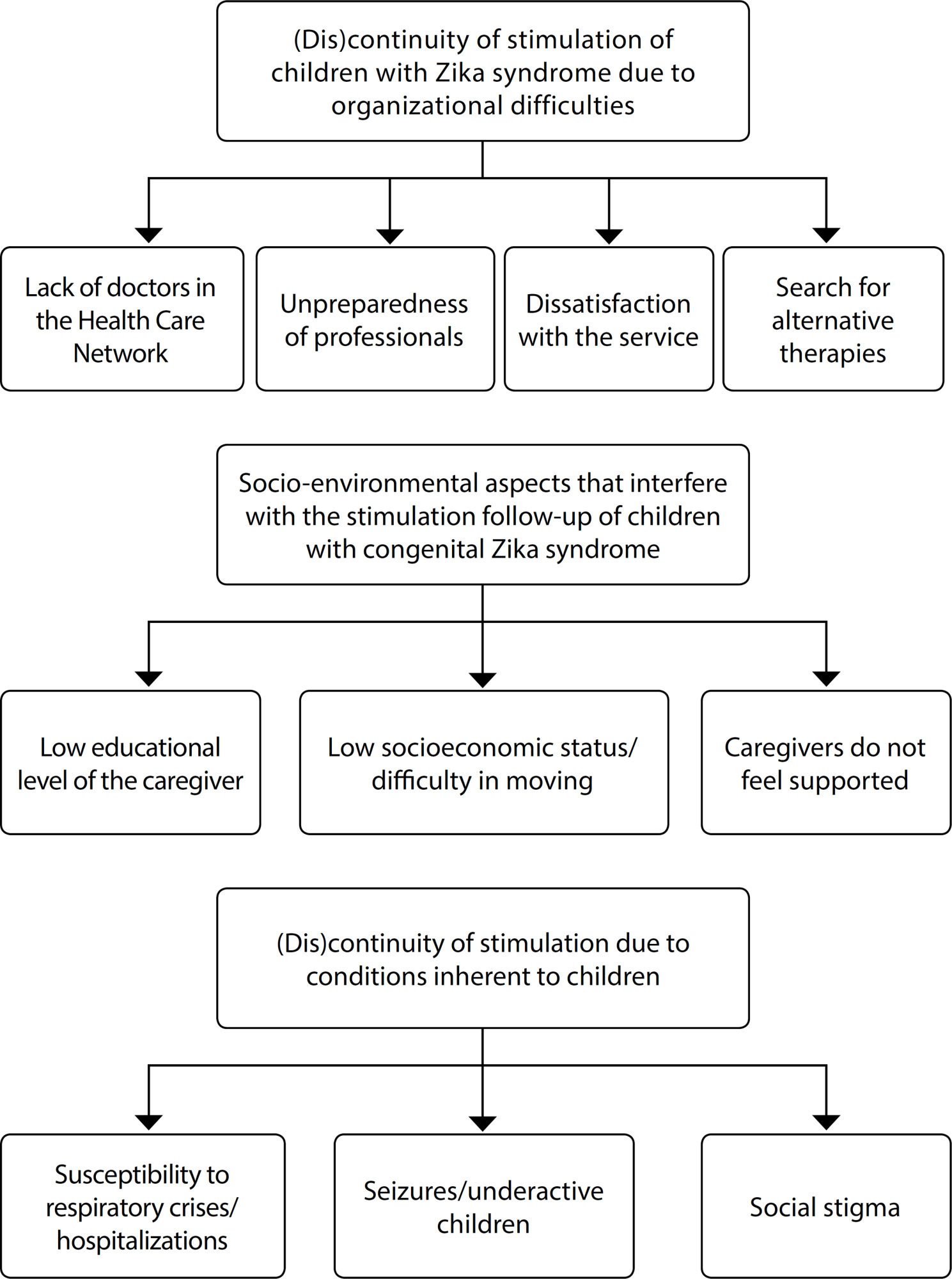
-
ORIGINAL ARTICLE08-20-2021
Risk of suicide among nursing students
Revista Brasileira de Enfermagem. 2021;74(6):e20200867
Abstract
ORIGINAL ARTICLERisk of suicide among nursing students
Revista Brasileira de Enfermagem. 2021;74(6):e20200867
DOI 10.1590/0034-7167-2020-0867
Views0See moreABSTRACT
Objectives:
to identify the risk and degree of risk of suicide in nursing students of a public institution in the countryside of Pernambuco, Brazil.
Methods:
this was a cross-sectional, quantitative research conducted with 150 students. For data collection, a sociodemographic questionnaire and the instrument, M.I.N.I. – Brazilian version 5.0.0 – Module C – Risk of suicide were used. Statistical analyses were performed with IBM(® )SPSS(®), version 23.
Results:
53.3% of nursing students had a risk of suicide, of which 20.7% had a high risk. Moreover, 22.67% reported previous suicide attempt. It is noteworthy that students without a partner have a higher risk of suicide (56.8%) than those with a partner (29.4%).
Conclusions:
it is perceived the need to develop programs that identify students at risk of suicide in higher education institutions, in order to raise awareness of the problem and implement policies to promote mental health in the academia.
-
REVIEW08-20-2021
Root Cause Analysis, Failures and Effects in pediatric total quality management: a scoping review
Revista Brasileira de Enfermagem. 2021;74(6):e20200954
Abstract
REVIEWRoot Cause Analysis, Failures and Effects in pediatric total quality management: a scoping review
Revista Brasileira de Enfermagem. 2021;74(6):e20200954
DOI 10.1590/0034-7167-2020-0954
Views0See moreABSTRACT
Objectives:
to analyze the applicability of Root Cause Analysis and Failure Mode and Effect Analysis tools, aiming to improve care in pediatric units.
Methods:
this is a scoping review carried out according to the Joanna Briggs Institute guidelines, following the Preferred Reporting Items for Systematic Reviews and Meta-Analyzes extension for Scoping Reviews. Search took place in May 2018 on 15 data sources.
Results:
search totaled 8,254 studies. After using the relevant inclusion and exclusion criteria, 15 articles were included in the review. Of these, nine were published between 2013 and 2018, 12 used Failure Mode and Effect Analysis and 11 carried out interventions to improve the quality of the processes addressed, showing good post-intervention results.
Final Considerations:
the application of the tools indicated significant changes and improvements in the services that implemented them, proving to be satisfactory for detecting opportunities for improvement, employing specific methodologies for harm reduction in pediatrics.
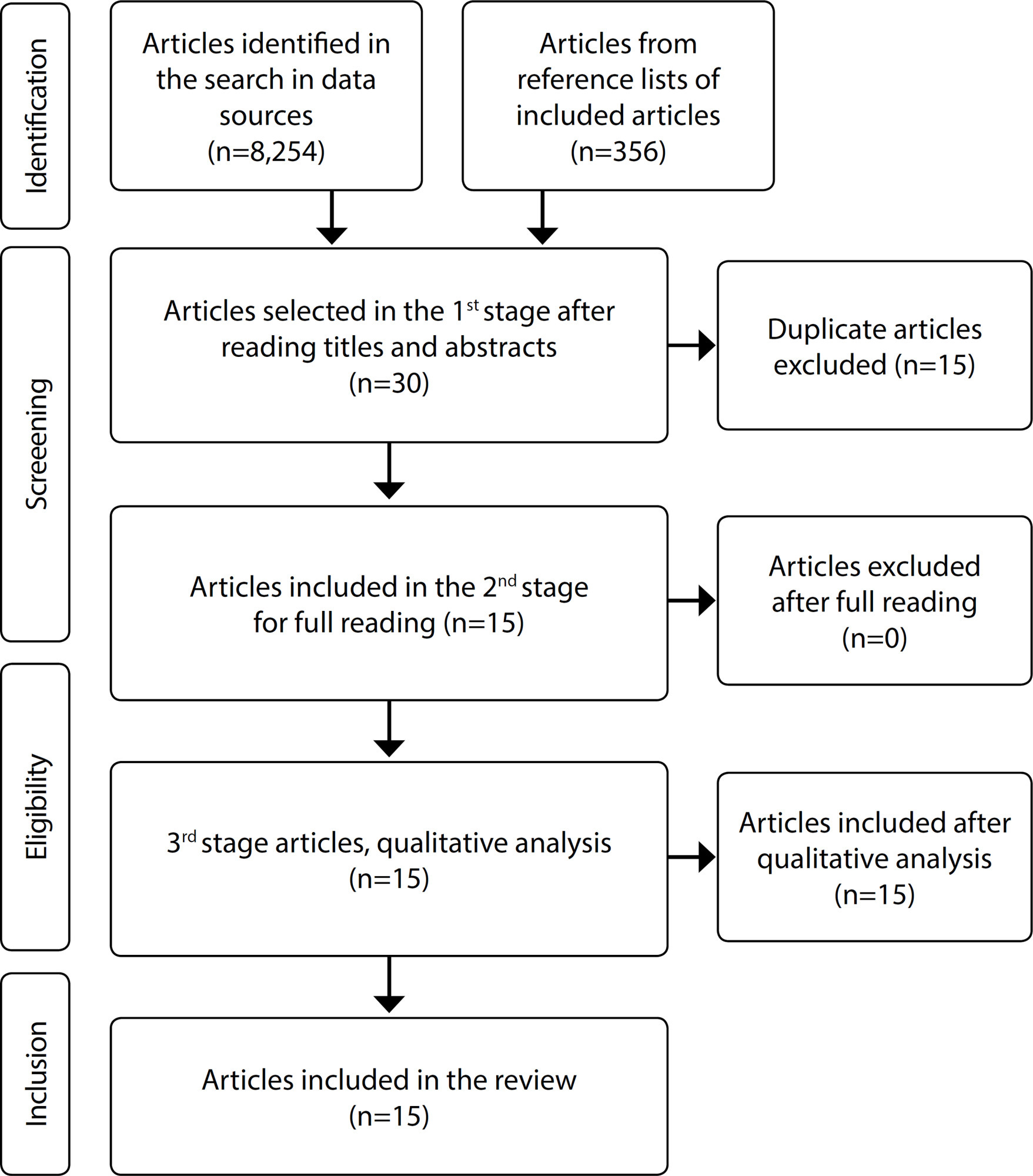
-
ORIGINAL ARTICLE07-26-2021
Representations about sexuality of people diagnosed late with HIV infection
Revista Brasileira de Enfermagem. 2021;74(6):e20201028
Abstract
ORIGINAL ARTICLERepresentations about sexuality of people diagnosed late with HIV infection
Revista Brasileira de Enfermagem. 2021;74(6):e20201028
DOI 10.1590/0034-7167-2020-1028
Views0See moreABSTRACT
Objective:
to understand the representations about sexuality of people diagnosed late with HIV infection and its implications in the delayed search for diagnosis.
Methods:
this is a qualitative study, whose theoretical and methodological framework was Social Representation Theory. The research was carried out with 18 people diagnosed late with HIV infection through an open interview. For data analysis, Structural Narration Analysis was used, with support from MAXQDA 12®.
Results:
representations about sexuality contributed to delayed diagnosis, such as trust in a fixed partnership, sexual intercourse is natural, sexuality as a taboo, search for pleasure in sexual intercourse, regardless of risks, denial of risk for HIV infection.
Final considerations:
representations about sexuality participate in a web of stereotypes and riskier ways of living, which contribute to delayed diagnosis. Sexual health education remains necessary and essential throughout people’s lives.
-
08-20-2021
Prevalence of central venous catheter salvage in newborn with staphylococcal bloodstream infection
Revista Brasileira de Enfermagem. 2021;74(6):e20201073
Abstract
Prevalence of central venous catheter salvage in newborn with staphylococcal bloodstream infection
Revista Brasileira de Enfermagem. 2021;74(6):e20201073
DOI 10.1590/0034-7167-2020-1073
Views0See moreABSTRACT
Objectives:
to establish the prevalence of salvage of central venous catheters in newborns with bloodstream infection caused by coagulase-negative staphylococci.
Methods:
retrospective cross-sectional study with 136 newborns admitted to the Neonatal Intensive Care Unit between 2011 and 2017. The total of 143 infection events undergoing antibiotic therapy were evaluated.
Results:
among the 143 infection events, 39 catheters in which antibiotic therapy was used were saved and in 69 cases, the device was removed. Positive central blood culture and single lumen catheter were factors associated with salvage failure. The probability of salvage decreased with infections diagnosed from 15 days of using the catheter. Negative blood culture raised the chance of salvage by fourfold.
Conclusions:
the use of antibiotic therapy in the treatment of infections resulted in a low prevalence of salvage of the central venous catheter. The probability of salvage was associated with variables of the device.
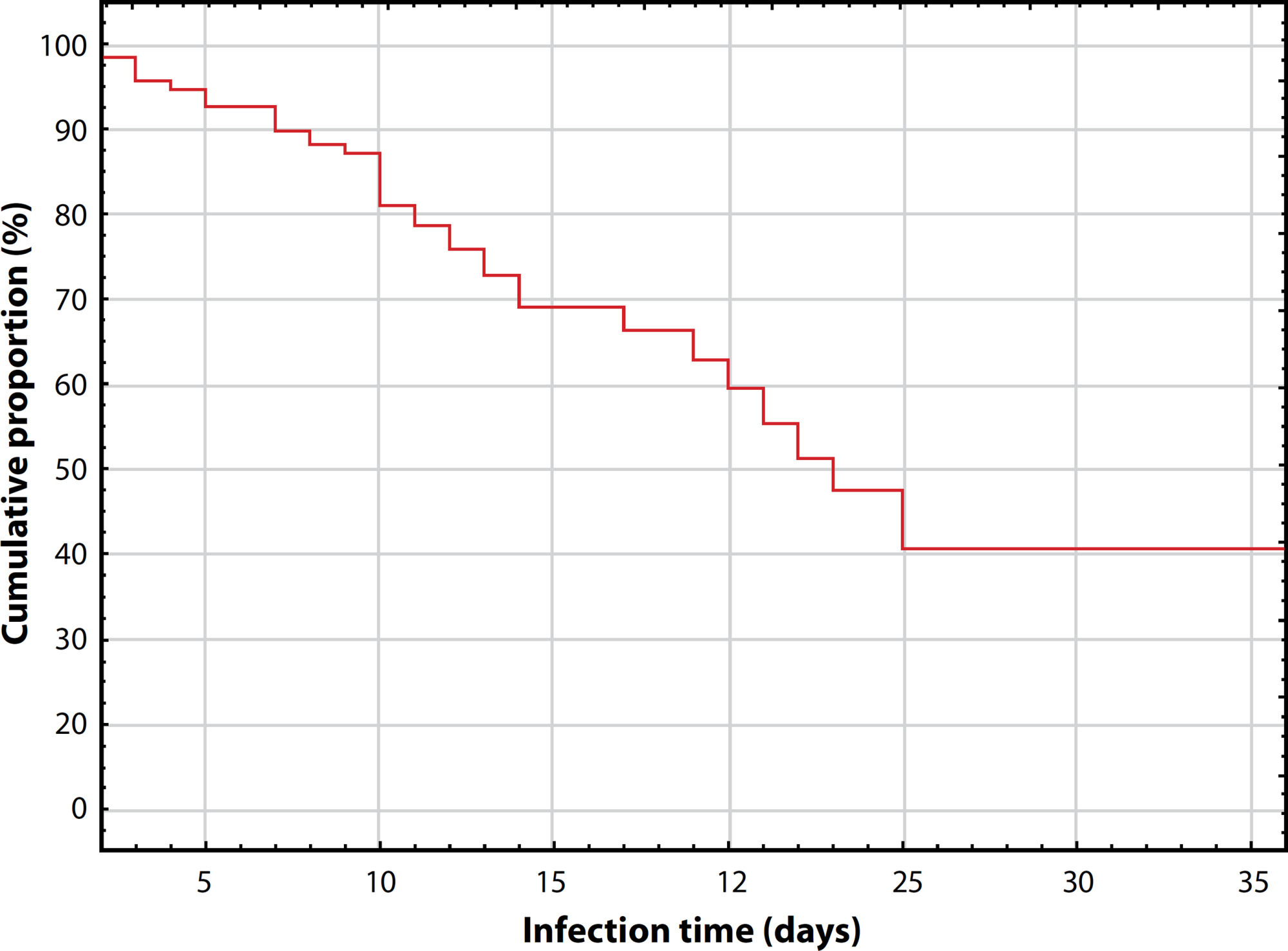
-
EXPERIENCE REPORT02-15-2021
Coronavirus infections: health care planning based on Orem’s Nursing Theory
Revista Brasileira de Enfermagem. 2021;74:e20200281
Abstract
EXPERIENCE REPORTCoronavirus infections: health care planning based on Orem’s Nursing Theory
Revista Brasileira de Enfermagem. 2021;74:e20200281
DOI 10.1590/0034-7167-2020-0281
Views0See moreABSTRACT
Objective:
to report the experience of professors and students of a graduate course on nursing care in coping with the new coronavirus (COVID-19) based on Self-Care Theory.
Method:
the active methodologies used were a literature search and seminar presentations, with an understanding of Orem’s theoretical concepts: health; man; self-care; universal, developmental and health deviation requirements; self-care activities; self-care deficits; the required therapeutic demand; nursing systems. The pandemic was considered a health deviation that requires critical thinking and nursing care planning. Methodological frameworks to classify nursing diagnoses, interventions, and outcomes were used.
Results:
for each health deviation, nursing systems were identified; self-care deficits, diagnoses; actions, interventions; and the form of assessment, outcomes.
Final considerations:
theoretical-practical reflections of the academic context support nursing care planning.
-
REFLECTION03-05-2021
Reflections on patient safety incident reporting systems
Revista Brasileira de Enfermagem. 2021;74:e20200307
Abstract
REFLECTIONReflections on patient safety incident reporting systems
Revista Brasileira de Enfermagem. 2021;74:e20200307
DOI 10.1590/0034-7167-2020-0307
Views0See moreABSTRACT
Objective:
To reflect on the main characteristics and recommendations of Incident Reporting Systems, discuss the population’s participation in reporting, and point out challenges in the Brazilian system.
Method:
Reflection study, based on Ordinance No. 529/13, which instituted the National Patient Safety Program, under Collegiate Board Resolution (CBR) No. 36/13; reflections by experts were added.
Results:
Reporting systems are a source for learning and monitoring, allow early detection of incidents, investigations and, mainly, the generation of recommendations prior to recurrences, in addition to raising information for patients and relatives. There is little participation of the population in the reporting, regardless of the type of system and characteristics such as confidentiality, anonymity, and mandatory nature.
Final Considerations:
In Brazil, although reporting is mandatory, there is an urgency to advance the involvement and participation of the population, professionals, and institutions. To simplify data entry by improving the interface and importing data from the reporting system is an objective to be achieved.
-
EXPERIENCE REPORT01-29-2021
Restructuring service at a mastology outpatient clinic during the COVID-19 pandemic
Revista Brasileira de Enfermagem. 2021;74:e20200571
Abstract
EXPERIENCE REPORTRestructuring service at a mastology outpatient clinic during the COVID-19 pandemic
Revista Brasileira de Enfermagem. 2021;74:e20200571
DOI 10.1590/0034-7167-2020-0571
Views0INTRODUCTIONCOVID-19 is a disease caused by the SARS-CoV-2 coronavirus (Severe Acute Respiratory Syndrome Coronavirus 2) and has brought a threat to public health worldwide. In need of immediate changes, adaptations tend to be the way out to avoid contamination that potentially does not distinguish race, color, gender().The global numbers of suspected and confirmed cases are […]See more
-
03-09-2020
Psychiatric nursing and mental health teaching in relation to Brazilian curriculum
Revista Brasileira de Enfermagem. 2020;73(2):e20180200
Abstract
Psychiatric nursing and mental health teaching in relation to Brazilian curriculum
Revista Brasileira de Enfermagem. 2020;73(2):e20180200
DOI 10.1590/0034-7167-2018-0200
Views0See moreABSTRACT
Objectives:
to know the scientific production on psychiatric nursing and mental health teaching in relation to Brazilian nursing curriculum.
Methods:
an Integrative Literature Review with no temporal delineation, whose data collection took place in ten Brazilian and international databases, adding to the total 35 objects of analysis.
Results:
a priori categories were adopted, consisting of the psychiatric nursing and mental health teaching in Brazil according to the 1923, 1949, 1962, 1972, 1994 and 2001 nursing curriculum, presented in the light of the dimensions: thought model; places of practice; methods or contents used; and profile or skills of the student.
Final considerations:
the study made it possible to observe psychiatric nursing and mental health teaching historical evolution, indicating that teaching transformations involved changes in curriculum, Psychiatric Reform and the way nursing undergraduate courses and schools take these determinants.
-
ORIGINAL ARTICLE04-03-2020
Nurse as an integrator in healthcare management of children with chronic condition
Revista Brasileira de Enfermagem. 2020;73(3):e20180453
Abstract
ORIGINAL ARTICLENurse as an integrator in healthcare management of children with chronic condition
Revista Brasileira de Enfermagem. 2020;73(3):e20180453
DOI 10.1590/0034-7167-2018-0453
Views0See moreABSTRACT
Objectives:
to understand the practice of the nurse in healthcare management of children with chronic condition in the hospital setting.
Methods:
analytical study of qualitative approach with theoretical and methodological reference of institutional ethnography. Developed in the pediatric unit of a university hospital, in a municipality in Northeastern Brazil. Data collections techniques were: participant observation, documentary analysis and semi-structured interview. Participants of the study totaled twenty professionals, including nurses, social workers, psychologists, pharmacists, nutritionists, physiotherapists, and doctors. For data analysis, it was used the Bardin’s Content Analysis with interface of the Atlas.ti software.
Results:
categories of analysis were “Nurse as mediator of healthcare management”; “Nursing process as a mechanism of healthcare management”.
Final
considerations: the nurse proved to be essential for healthcare management of the child with chronic condition, acting as mediator of the relationship between the doctor, the members of the health team, the user and their family.
-
REVIEW10-19-2020
Effectiveness of skin protectors and calendula officinalis for prevention and treatment of radiodermatitis: an integrative review
Revista Brasileira de Enfermagem. 2020;73:e20190815
Abstract
REVIEWEffectiveness of skin protectors and calendula officinalis for prevention and treatment of radiodermatitis: an integrative review
Revista Brasileira de Enfermagem. 2020;73:e20190815
DOI 10.1590/0034-7167-2019-0815
Views0See moreABSTRACT
Objective:
to analyze the effectiveness of skin protectors and Calendula officinalis for prevention and treatment of radiodermatitis.
Method:
an integrative review conducted at CINAHL, Cochrane Library, Embase, MEDLINE/PubMed, IBECS, LILACS, and Web of Science. The final sample consisted of five studies, four clinical studies and one preclinical. Critical appreciation and narrative synthesis of the findings were carried out.
Results:
the Cavilon™ skin protector was more effective than Sorbolene (cream with 10% glycerin) and less effective than Mometasone Furoate cream. Calendula officinalis was more effective than Trolamine and essential fatty acids and less effective than Ching Wan Hung® for prevention and treatment of radiodermatitis.
Conclusion:
data confirm the potential of Calendula officinalis for prevention and treatment of radiodermatitis and point to promising results regarding skin protector use; however, there is a need for further testing as to the effectiveness of such products.
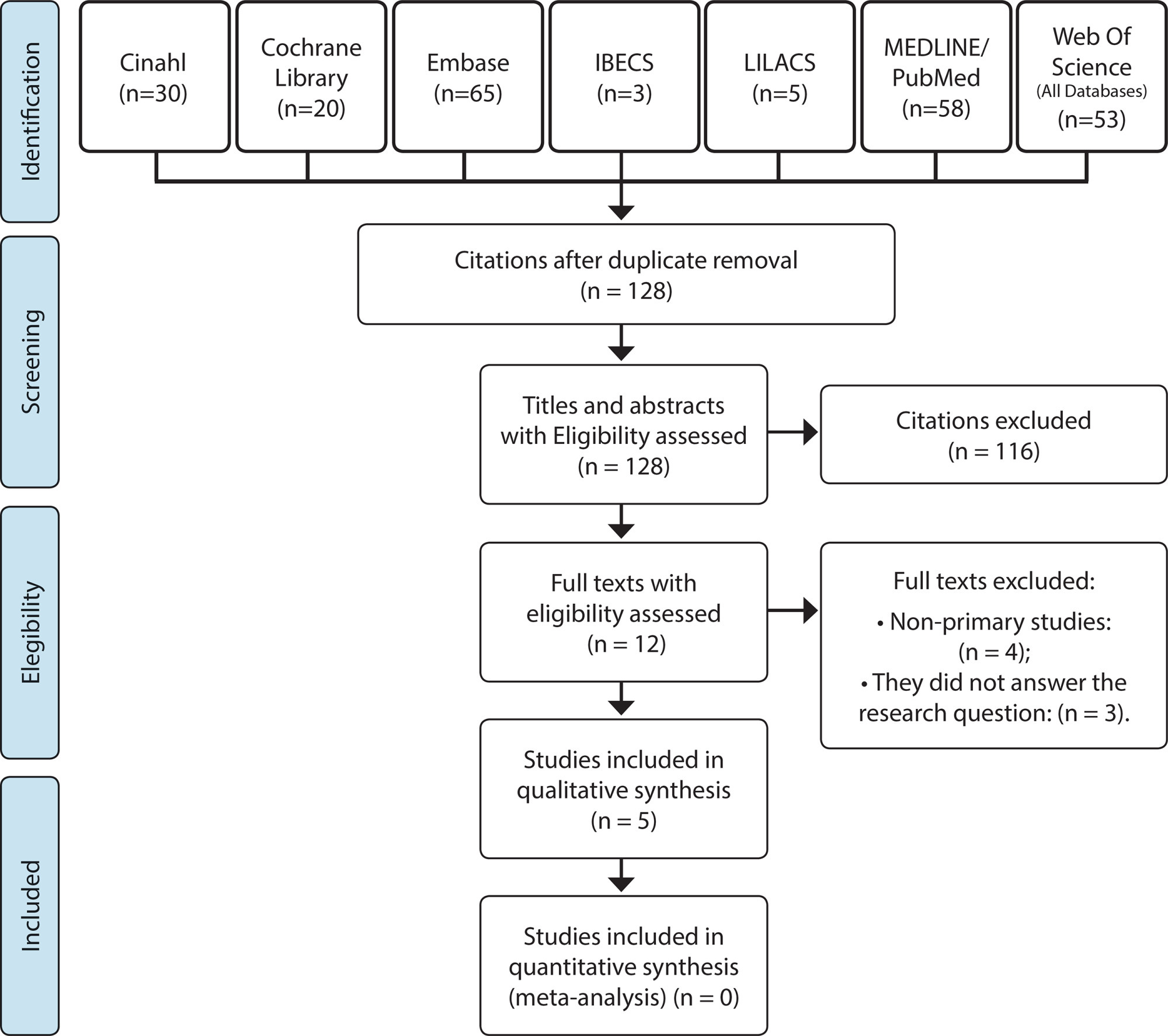
-
ORIGINAL ARTICLE07-08-2020
Cognition and quality of life relationship among the elderly community: a cross-sectional study
Revista Brasileira de Enfermagem. 2020;73:e20190030
Abstract
ORIGINAL ARTICLECognition and quality of life relationship among the elderly community: a cross-sectional study
Revista Brasileira de Enfermagem. 2020;73:e20190030
DOI 10.1590/0034-7167-2019-0030
Views0See moreABSTRACT
Objective:
to assess cognitive functions and their association with quality of life among elderly people enrolled in a Family Health Unit (FHU) of Primary Health Care in Recife-PE.
Methods:
a quantitative, descriptive, cross-sectional study in which elderly aged 60 years and over were studied.
Results:
76.7% of the elderly were women and the age group was less than or equal to 70 years. 68.6% had cognitive impairment, and in the quality of life assessment it was found that the social participation facet had the highest mean score among the elderly (14.25), while the lowest was observed in the sensory functioning facet (9.10). There was an association between cognitive decline and quality of life.
Conclusion:
most of the elderly had good quality of life rates, but low cognitive level. Using screening tools allows early detection of health problems, guiding the nursing staff in the construction of preventive measures.

-
ORIGINAL ARTICLE05-18-2020
Expert assessment of the “Neonatal Pain Assessment Program” online course
Revista Brasileira de Enfermagem. 2020;73(4):e20180392
Abstract
ORIGINAL ARTICLEExpert assessment of the “Neonatal Pain Assessment Program” online course
Revista Brasileira de Enfermagem. 2020;73(4):e20180392
DOI 10.1590/0034-7167-2018-0392
Views0See moreABSTRACT
Objectives:
to assess layout quality, visual identity and content of the “Neonatal Pain Assessment Program” (Programa de Avaliação da Dor Neonatal) online course.
Methods:
a descriptive exploratory study. The course was assessed by 24 experts in pain, neonatology and education. A form containing 20 questions on technical, interface and educational aspects was used. For each item, the score ranged from 0 to 1. Mean scores above 0.7 were considered indicative of high quality of the items. Descriptive statistics were used for data analysis.
Results:
navigation, clarity, ease of localization, content relevance, contextualization, content correction, multiple windows, ease of use, ease of return, ergonomics, esthetics, special brands, audiovisual resources, information and portability were assessed. All aspects obtained a mean ≥ 0.70 and no changes were required.
Conclusions:
the Neonatal Pain Assessment Program is considered as quality educational technology and promising strategy for health education.
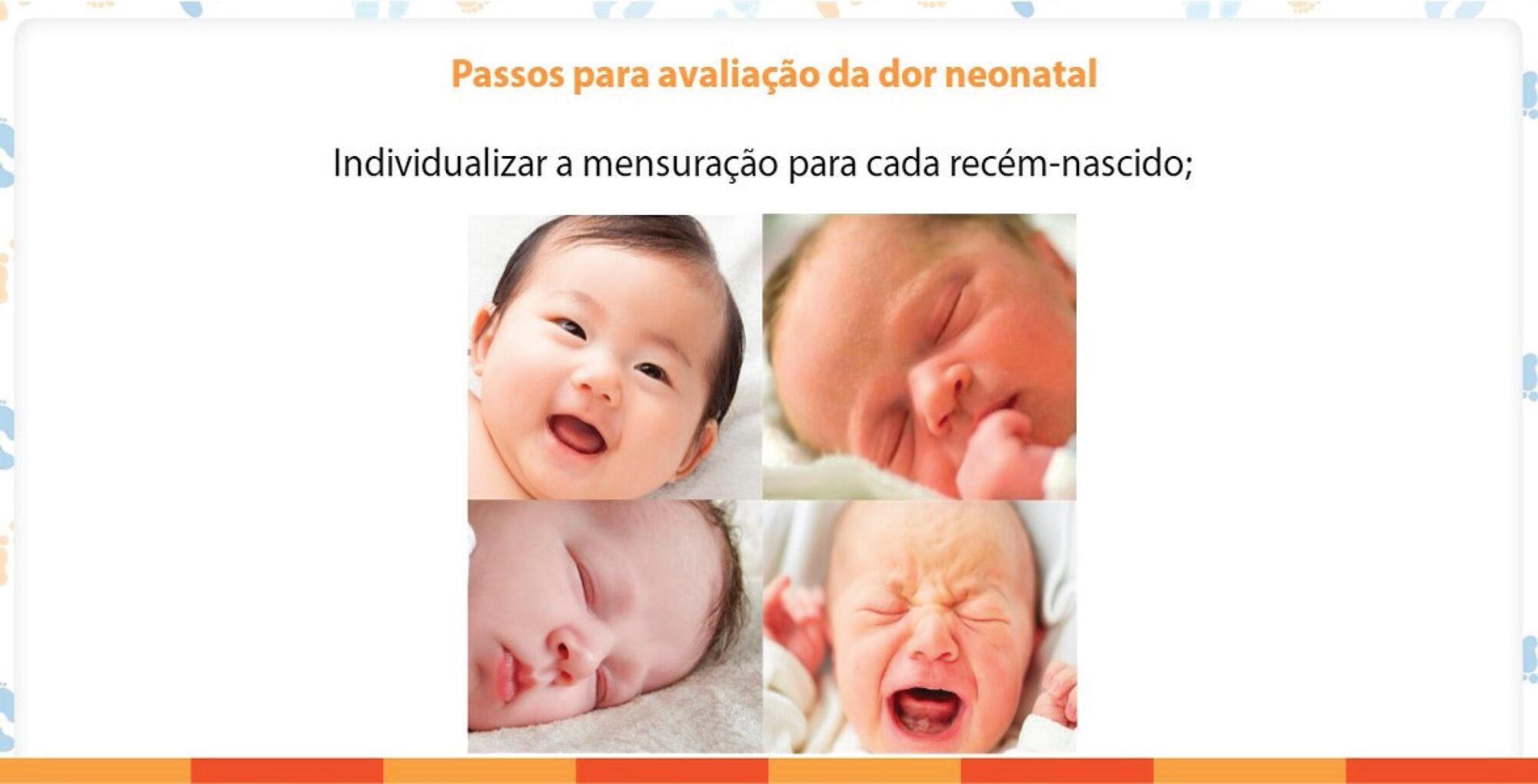
-
05-28-2021
Are symptoms of depression and anxiety in nursing students associated with their sociodemographic characteristics?
Revista Brasileira de Enfermagem. 2021;74:e20200503
Abstract
Are symptoms of depression and anxiety in nursing students associated with their sociodemographic characteristics?
Revista Brasileira de Enfermagem. 2021;74:e20200503
DOI 10.1590/0034-7167-2020-0503
Views0See moreABSTRACT
Objective:
to investigate symptoms of depression and anxiety and their association with the sociodemographic characteristics of undergraduate nursing students.
Methods:
a cross-sectional analytical study carried out with students from the Faculty of Nursing at Universidade Federal de Juiz de Fora from June to July 019. Data were collected through a sociodemographic questionnaire and the Beck Depression and Anxiety Inventories.
Results:
192 students participated, with a mean age of 21.44 (±3.56) years. 85.93% of participants were female. The mean depression score was 22.40 (±12.35), and anxiety was 17.56 (±11.98). There was a difference in the mean of the scales for sex and psychotropic drugs (p<0.05). Women presented moderate and severe classification for both scales. Severe symptoms prevailed among students from the 6th to the 10th semester (18.22%).
Conclusion:
there was an association between depression and anxiety symptoms related to gender and psychotropic drugs.
-
01-22-2021
Humanization practices in the parturitive course from the perspective of puerperae and nurse-midwives
Revista Brasileira de Enfermagem. 2021;74:e20190743
Abstract
Humanization practices in the parturitive course from the perspective of puerperae and nurse-midwives
Revista Brasileira de Enfermagem. 2021;74:e20190743
DOI 10.1590/0034-7167-2019-0743
Views1See moreABSTRACT
Objective:
to understand humanization practices in the parturitive course from the point of view of purperae and nurse-midwives.
Methods:
an exploratory, descriptive, qualitative research carried out in a maternity hospital in Bahia State. Semi-structured interviews were carried out, with a structured script applied to 11 mothers and 5 nurse-midwives from March to June 2019. Analysis followed Bardin’s content structure.
Results:
this study unveiled the importance of using soft care technologies, respect for female role, active participation and women’s autonomy as a positive impact on the parturition process.
Final considerations:
nurse-midwives are qualified professionals to assist women in labor and birth. They can favor the implantation and implementation of care with humanization practices, respect for women’s choices and incentive to the normal way of delivery with an expanded view of individual and multidisciplinary needs.
-
03-05-2021
Moral suffering in health professionals: portrait of the work environment in times of COVID-19
Revista Brasileira de Enfermagem. 2021;74:e20200653
Abstract
Moral suffering in health professionals: portrait of the work environment in times of COVID-19
Revista Brasileira de Enfermagem. 2021;74:e20200653
DOI 10.1590/0034-7167-2020-0653
Views0See moreABSTRACT
Objective:
To analyze potential triggers of moral suffering experiences of health professionals, reported in the media, during the COVID-19 pandemic and to propose a theoretical construct of analysis.
Methods:
Study with qualitative approach whose data source were 50 reports published online, collected passively and actively, submitted to Content Analysis with the help of ATLAS.ti software.
Results:
The potential moral problems that trigger moral suffering are related to the threat to moral integrity, infrastructure/logistics and teamwork problems, and emotional aspects, revealing their articulation with damage to the foundations of a healthy work environment, which generated the proposal of a construct.
Final considerations:
The articulation between the experiences of moral suffering and the commitment of the fundamentals of a healthy work environment has brought important contributions to the adoption of strategies to protect and stimulate moral deliberation by professionals in favor of practice and society.
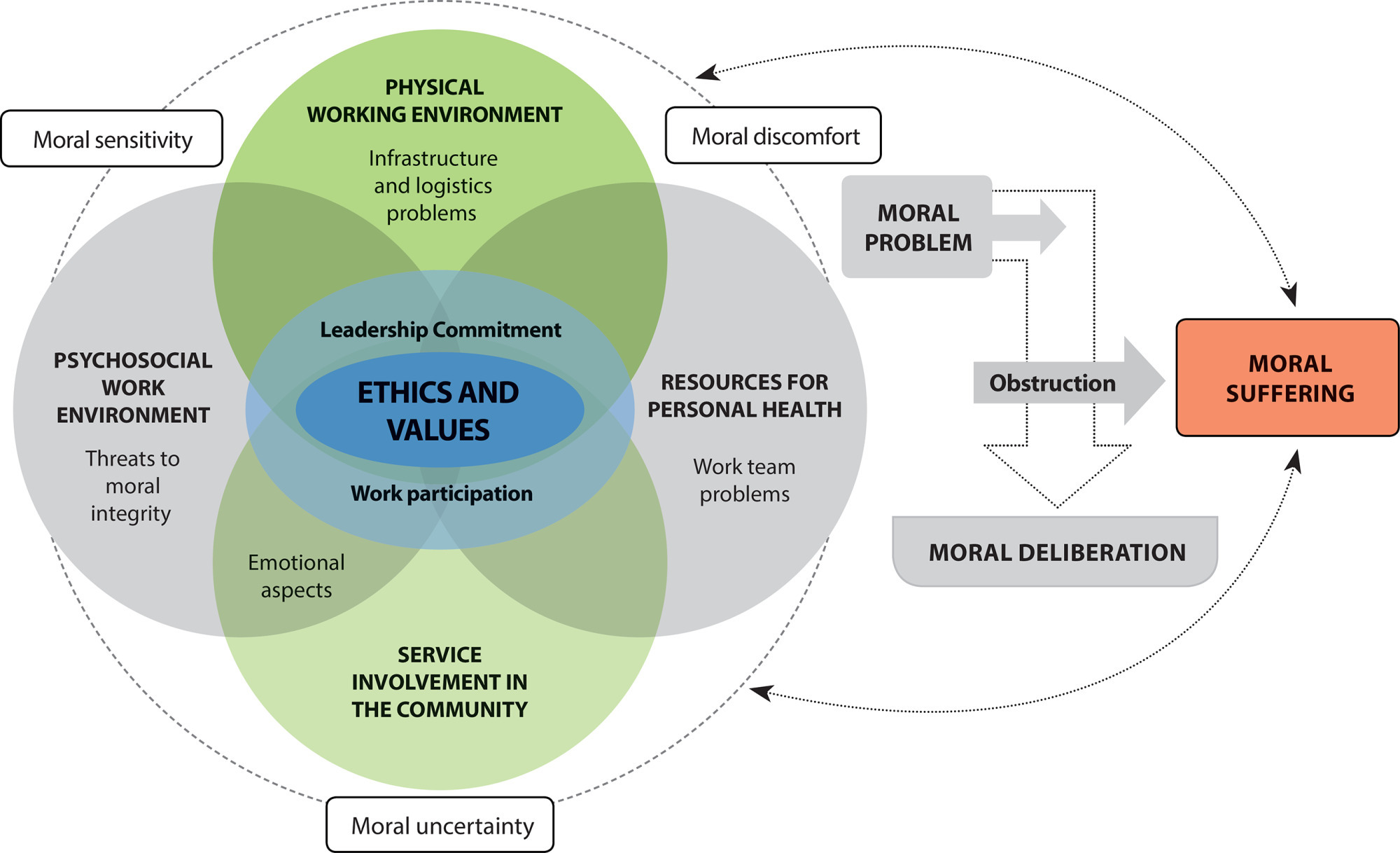
Search
Search in:
Nuvem de Tags
Adolescente (85) Atenção Primária à Saúde (239) COVID-19 (91) Criança (91) Cuidados de Enfermagem (269) Educação em Enfermagem (151) Educação em Saúde (139) Enfermagem (930) Enfermagem Pediátrica (86) Estudantes de Enfermagem (77) Estudos de Validação (131) Família (87) Idoso (208) Promoção da Saúde (99) Qualidade de Vida (104) Saúde do Trabalhador (86) Saúde Mental (145) Saúde Pública (82) Segurança do Paciente (150) Tecnologia Educacional (100)



